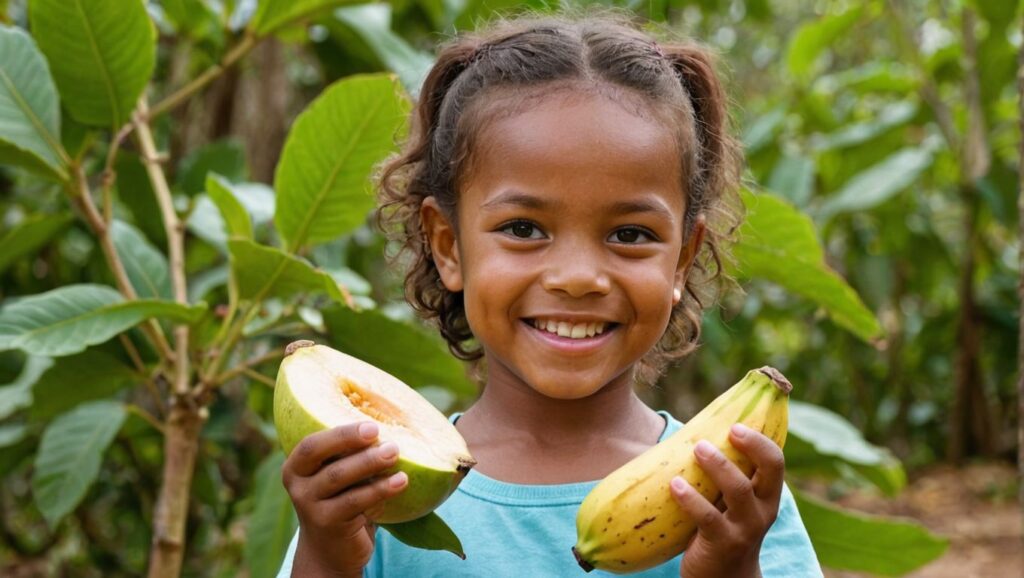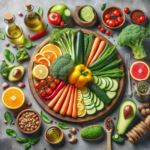Discover how guava and bananas can unlock growth potential in your diet and health for improved well-being and vitality. By consuming these fruits, you can unlock growth and enhance your overall health.
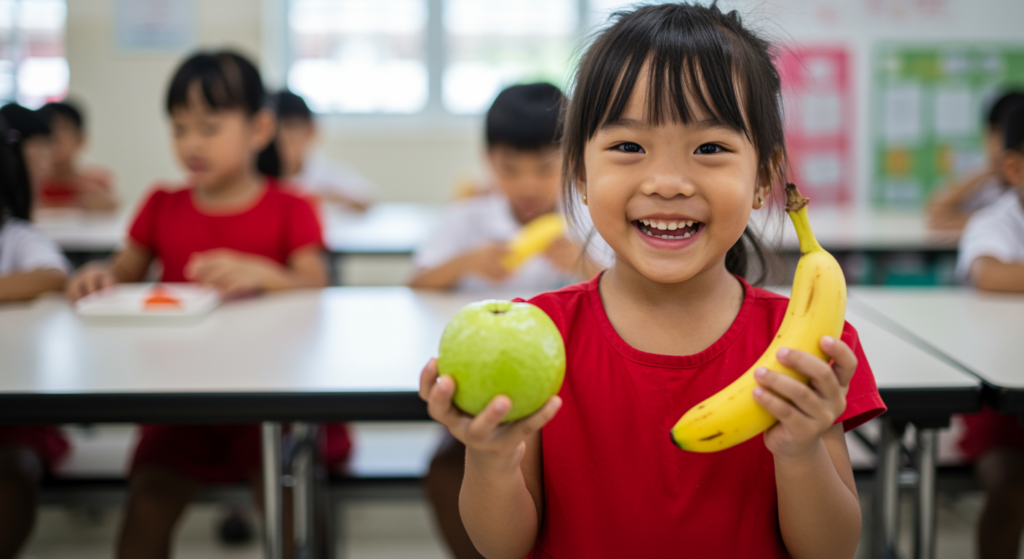
Table of Contents
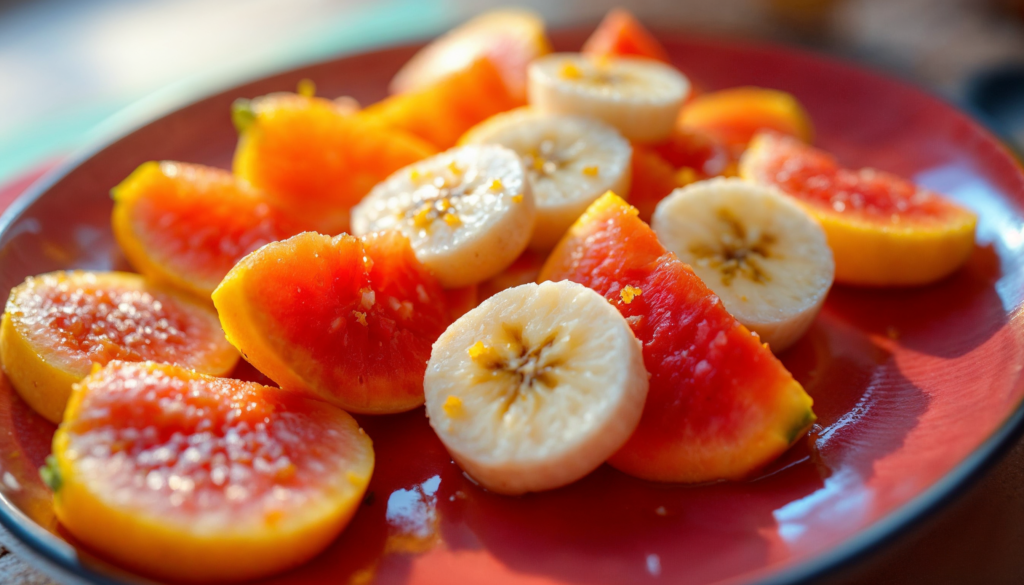
Unlock Growth: 5 Ways Guava and Bananas Enhance Potential
Incorporating guava and bananas into your daily routine can truly unlock growth in various aspects of health.
Unlock Growth with Nutrient-Rich Fruits
Both guava and bananas are essential for unlocking growth by providing key nutrients that support the immune system.
Explore how these fruits can unlock growth and provide the necessary vitamins for your health.
To unlock growth, integrate guava and bananas into your meals regularly.
H3: The Nutritional Powerhouses: Guava and Banana
Overview of Guava and Banana’s Nutritional Profiles
Both guava and banana are nutritional powerhouses, offering a wide range of vitamins, minerals, and other nutrients essential for children’s growth and development.
- Guava: This tropical fruit is incredibly rich in vitamin C, offering four times the amount found in oranges. It’s also packed with dietary fiber, vitamin A, folate, potassium, and antioxidants. Guava has a low-calorie count and provides an array of health benefits, including boosting the immune system, promoting digestive health, and enhancing skin health.
- Banana: Known for its high potassium content, bananas are a staple in many diets. They are rich in vitamin B6, vitamin C, dietary fiber, and magnesium. Bananas are easily digestible, making them an excellent choice for children. They provide sustained energy, support heart health, and help maintain healthy blood pressure levels.
Key Vitamins and Minerals in Guava and Banana
- Vitamin C: Essential for immune function and skin health, with guava being an exceptional source.
- Dietary Fiber: Important for digestive health and regular bowel movements, found abundantly in both fruits.
- Potassium: Vital for heart health and muscle function, with bananas being a top source.
- Vitamin A: Crucial for vision and growth, more prominent in guavas.
- Vitamin B6: Supports brain development and function, found in bananas.
- Folate: Important for cell growth and development, present in guavas.
- Magnesium: Supports muscle and nerve function, found in bananas.
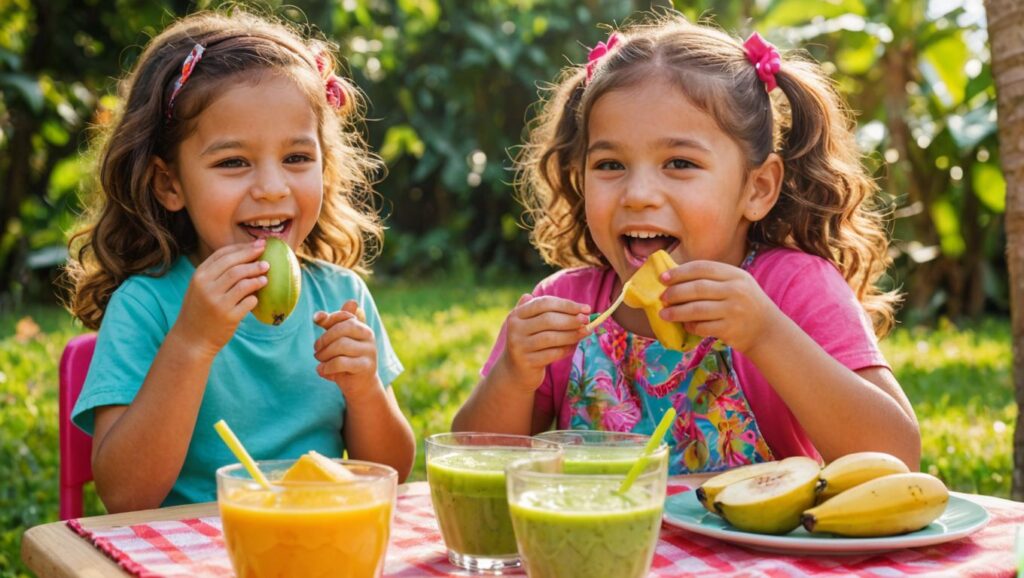
Comparing Guava and Bananas for Kids’ Health
Vitamin C Content and Its Benefits
- Guava: Provides around 228 mg of vitamin C per 100 grams, making it one of the richest sources. Vitamin C boosts the immune system, aids in collagen production for healthy skin, and acts as a powerful antioxidant.
- Banana: Contains about 9 mg of vitamin C per 100 grams. While not as high as guava, bananas still contribute to overall vitamin C intake, supporting immune health and skin vitality.
Dietary Fiber and Digestive Health
- Guava: Offers about 5.4 grams of dietary fiber per 100 grams, promoting healthy digestion and preventing constipation. Fiber also helps regulate blood sugar levels and supports weight management.
- Banana: Contains about 2.6 grams of dietary fiber per 100 grams. Bananas are known for their ability to aid digestion, ease gastrointestinal issues, and provide a soothing effect on the stomach.
Potassium and Heart Health
- Guava: Contains around 417 mg of potassium per 100 grams, which helps maintain healthy blood pressure levels and supports heart function.
- Banana: Provides approximately 358 mg of potassium per 100 grams. Potassium is essential for cardiovascular health, muscle function, and electrolyte balance.
Unlock Growth with Immune System Boosters through Guava and Banana
Vitamin C: The Immunity Champion
How Guava and Banana Boost the Immune System
- Guava: The high vitamin C content in guava strengthens the immune system, helping the body fight off infections and illnesses. Vitamin C also promotes the production of white blood cells, which are crucial for immune defense.
- Banana: While lower in vitamin C, bananas contribute to overall immune health. They provide essential nutrients that support the body’s defense mechanisms and help maintain a balanced immune response.
Unlock growth in digestion with the dietary fiber found in guava and banana.
Role of Antioxidants in Children’s Health
- Guava: Rich in antioxidants such as lycopene, quercetin, and vitamin C, guava protects the body from oxidative stress and reduces inflammation. These antioxidants help safeguard children’s cells from damage, promoting overall health and well-being.
- Banana: Contains antioxidants like dopamine and catechins, which provide protective effects against oxidative damage. These compounds support the immune system and contribute to reduced inflammation.
Building a Strong Defense with Guava and Banana
Daily Intake Recommendations for Kids
- Guava: Children can benefit from consuming 1-2 small guavas per day, providing a substantial boost to their vitamin C intake and overall nutrient profile.
- Banana: One banana a day is a good guideline for children, offering a healthy dose of potassium, fiber, and other essential nutrients.
Practical Tips for Incorporating These Fruits into Meals
- Guava: Add guava slices to fruit salads, blend them into smoothies, or simply eat them fresh. Guava can also be used in desserts, salsas, and as a topping for yogurt or cereal.
- Banana: Include bananas in breakfast by adding them to cereal, oatmeal, or pancakes. Bananas can be blended into smoothies, eaten on their own, or used in baking for healthy treats like banana bread or muffins.
Unlock Growth with Healthy Digestion
Dietary Fiber: The Digestive Aid
Importance of Fiber for Children’s Digestive Health
Dietary fiber is essential for maintaining healthy digestion and preventing constipation in children. It helps regulate bowel movements, promotes the growth of beneficial gut bacteria, and supports overall digestive health.
Guava vs. Banana: Fiber Content Comparison
- Guava: With its high fiber content, guava is excellent for promoting regular bowel movements and preventing constipation.
- Banana: Bananas provide a moderate amount of fiber and are known for their soothing effect on the digestive tract, making them ideal for children with sensitive stomachs.
To unlock growth, consider how guava and banana’s nutrients can help kids thrive.
H3: Promoting Gut Health with Guava and Banana
Prebiotics and Their Role in Gut Health
- Guava: Contains prebiotic fiber that supports the growth of beneficial gut bacteria, improving overall gut health and digestion.
- Banana: Bananas are a natural source of prebiotics, particularly resistant starch, which nourishes beneficial gut bacteria and promotes a healthy digestive system.
Easy Recipes for Kids Featuring Guava and Banana
- Guava: Guava smoothie – blend guava with yogurt, honey, and a splash of orange juice for a refreshing and nutritious drink.
- Banana: Banana oatmeal – add sliced banana to cooked oatmeal along with a drizzle of honey and a sprinkle of cinnamon for a wholesome breakfast.
H2: Unlock Growth with Essential Vitamins and Minerals
H3: Vitamin A: Vision and Growth
Benefits of Vitamin A for Children’s Eye Health
Vitamin A is crucial for maintaining healthy vision and supporting overall growth. It plays a vital role in the development of the eyes and helps prevent night blindness and other vision-related issues.
Guava’s Superior Vitamin A Content
Guava is an excellent source of vitamin A, providing significant amounts that contribute to healthy vision and growth in children. Including guava in their diet can help ensure they receive adequate vitamin A for optimal eye health.
Potassium: Heart and Muscle Health
Importance of Potassium for Kids
Potassium is essential for maintaining healthy heart function, muscle contraction, and electrolyte balance. It helps regulate blood pressure and supports overall cardiovascular health.
Comparing Potassium Levels in Guava and Banana
- Guava: Provides a substantial amount of potassium, which helps maintain healthy blood pressure levels and supports heart health.
- Banana: Known for its high potassium content, bananas are excellent for supporting cardiovascular health, muscle function, and overall growth in children.
Unlock Growth: 5 Ways Guava and Bananas Enhance Potential
Unlock Growth with Overall Well-Being
Enhancing Cognitive Development
Nutrients in Guava and Banana that Support Brain Health
Both guava and banana are packed with essential nutrients that contribute to cognitive development in children.
- Guava: This fruit is rich in vitamin C, which is crucial for brain development and function. It also contains vitamin B6, which plays a significant role in neurotransmitter synthesis. Additionally, guava is a good source of folate, an important nutrient for brain development and cognitive function.
- Banana: Bananas are known for their high potassium content, which is vital for maintaining proper brain function and preventing cognitive decline. They also contain vitamin B6, which aids in the production of serotonin and dopamine, neurotransmitters that regulate mood and cognition. Bananas provide magnesium, which is essential for brain health and helps improve learning and memory.
Studies on Cognitive Benefits of These Fruits
Several studies have highlighted the cognitive benefits of consuming guava and banana.
- A study published in the Journal of Nutrition found that children who consumed higher amounts of vitamin C had better cognitive performance. Guava, being an excellent source of vitamin C, can contribute to improved brain function and cognitive abilities.
- Another study in the British Journal of Nutrition reported that potassium intake is associated with enhanced cognitive function in children. Bananas, being rich in potassium, can help support cognitive development and mental sharpness.
- Research has also shown that vitamin B6 plays a crucial role in brain development and function. Both guava and banana, being good sources of vitamin B6, can help support cognitive health in children.
Promoting Physical Growth and Development
Role of Essential Nutrients in Physical Growth
Essential nutrients found in guava and banana play a vital role in promoting physical growth and development in children.
- Vitamin A: Crucial for vision and immune function, vitamin A supports healthy growth and development. Guava, being a good source of vitamin A, can help ensure that children receive adequate amounts of this essential nutrient.
- Potassium: Important for muscle function and overall growth, potassium helps regulate fluid balance and supports proper muscle contractions. Bananas, being rich in potassium, can help support physical growth and development.
- Dietary Fiber: Essential for digestive health, dietary fiber helps maintain regular bowel movements and supports overall health. Both guava and banana are good sources of dietary fiber, promoting healthy digestion and overall well-being.
Practical Tips for Parents to Encourage Fruit Consumption
- Make it Fun: Create fun and colorful fruit platters with guava and banana slices. Use cookie cutters to shape the fruits into fun shapes that kids will love.
- Incorporate into Meals: Add guava and banana slices to cereals, yogurt, or oatmeal. Blend them into smoothies or use them as toppings for pancakes and waffles.
- Lead by Example: Show your kids that you enjoy eating guava and banana. When they see you enjoying these fruits, they are more likely to try and enjoy them as well.
- Involve Kids in Preparation: Let your kids help with washing, peeling, and cutting the fruits. When they are involved in the preparation process, they are more likely to eat and enjoy the fruits.
Unlock Growth with Practical Tips for Parents
Unlock growth potential with potassium found in bananas for heart health.
Incorporating Guava and Banana into Daily Diet
Unlock growth by incorporating guava’s vitamin A into your child’s diet for better vision.
Creative Snack Ideas and Recipes
- Guava Smoothie: Blend guava with yogurt, honey, and a splash of orange juice for a refreshing and nutritious drink.
- Banana Oatmeal: Add sliced banana to cooked oatmeal along with a drizzle of honey and a sprinkle of cinnamon for a wholesome breakfast.
- Fruit Salad: Combine guava and banana slices with other fruits like berries and apples to create a colorful and delicious fruit salad.
- Guava Popsicles: Blend guava with a little water and freeze in popsicle molds for a healthy and refreshing treat.
- Banana Muffins: Use ripe bananas to make healthy and delicious banana muffins. Add in some chopped nuts or chocolate chips for extra flavor.
Unlock growth with the essential nutrients provided by guava for overall well-being.
Understanding how to unlock growth with proper portion sizes of guava and banana is key.
Tips for Picky Eaters
- Introduce Slowly: Start by introducing small amounts of guava and banana and gradually increase the portions as your child becomes more accustomed to the flavors.
- Pair with Favorites: Combine guava and banana with other foods that your child already enjoys. For example, mix banana slices with peanut butter or add guava chunks to their favorite yogurt.
- Make it Fun: Create fun and appealing presentations, such as fruit kabobs or smiley face fruit platters. Use colorful plates and utensils to make the eating experience more enjoyable.
- Be Persistent: It may take several attempts for a child to accept a new fruit. Keep offering guava and banana in different forms and be patient.
Ensuring Balanced Nutrition for Kids
Combining Guava and Banana with Other Healthy Foods
- Balanced Meals: Pair guava and banana with other nutrient-rich foods like whole grains, lean proteins, and healthy fats to create balanced and nutritious meals.
- Variety: Encourage a variety of fruits and vegetables in your child’s diet to ensure they receive a wide range of vitamins and minerals.
- Smoothies: Blend guava and banana with other fruits, vegetables, and a source of protein like yogurt or nut butter to create a nutrient-dense smoothie.
Monitoring Portion Sizes and Frequency
- Moderation: While guava and banana are nutritious, it’s important to serve them in moderation. Balance their intake with other fruits and vegetables to provide a well-rounded diet.
- Serving Sizes: For younger children, start with small serving sizes (e.g., half a banana or a few slices of guava) and adjust based on their appetite and nutritional needs.
- Frequency: Aim to include guava and banana in your child’s diet a few times a week, along with a variety of other fruits to ensure a diverse and balanced intake of nutrients.
Many parents have good intentions when it comes to their children’s nutrition, but certain misconceptions can sometimes lead to misguided choices. Here are some common nutritional misconceptions and the facts to clarify them:
- Myth: Multivitamins can replace a balanced diet.
- Fact: While multivitamins can supplement nutrient intake, they cannot replace the benefits of a varied and balanced diet. Whole foods provide a complex array of nutrients, fiber, and other beneficial compounds that supplements alone cannot offer.
- Myth: Kids need a low-fat diet.
- Fact: Healthy fats are crucial for children’s growth and development, particularly for brain development. Instead of eliminating fats, focus on providing healthy fats from sources like avocados, nuts, seeds, and olive oil.
- Myth: Sugar is only harmful if it’s added.
- Fact: Naturally occurring sugars found in fruits and dairy products are not harmful when consumed in moderation. However, excessive intake of added sugars from processed foods and sugary drinks can contribute to health issues like obesity and dental problems.
- Myth: Carbohydrates should be limited in children’s diets.
- Fact: Carbohydrates are a primary source of energy for growing children. Opt for complex carbohydrates such as whole grains, fruits, and vegetables, which provide sustained energy and essential nutrients.
- Myth: Juice is a healthy substitute for whole fruit.
- Fact: While 100% fruit juice can be part of a healthy diet, it lacks the fiber found in whole fruit and can be high in natural sugars. Whole fruits are a better choice as they provide fiber, vitamins, and a sense of fullness.
- Myth: Organic foods are always more nutritious.
- Fact: Organic foods may have fewer pesticides and additives, but they are not necessarily more nutritious than conventional foods. The nutritional content of fruits and vegetables depends more on factors like soil quality, freshness, and how they are grown.
- Myth: Protein shakes are essential for active kids.
- Fact: Most children can meet their protein needs through a balanced diet that includes lean meats, dairy, beans, and nuts. Protein shakes are usually unnecessary and can lead to excessive protein intake.
- Myth: Calcium from dairy is the only way to build strong bones.
- Fact: While dairy is a great source of calcium, other foods like leafy greens, almonds, and fortified plant-based milks also provide calcium. Ensuring a varied diet helps meet calcium needs for bone health.
- Myth: Low-calorie diets are good for weight control in kids.
- Fact: Children need sufficient calories for growth and development. Rather than focusing on calorie restriction, emphasize nutrient-dense foods and healthy eating habits to maintain a healthy weight.
- Myth: Meal skipping can help control weight.
- Fact: Skipping meals can lead to overeating later and disrupt metabolism. Regular, balanced meals and snacks help maintain energy levels and promote healthy eating habits.
By debunking these misconceptions, parents can make more informed decisions about their children’s nutrition and support their growth and development effectively.
To unlock growth, remember to provide a balanced diet including guava and banana.
Unlock growth in your child’s diet with various recipes including these fruits.
Make it fun to unlock growth by involving your kids in preparing guava and banana snacks.
Unlock growth potential by making these fruits a staple in your household.
Daily doses of guava and banana can unlock growth in children.
Unlock growth by addressing common misconceptions around fruit consumption.

